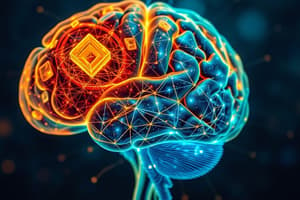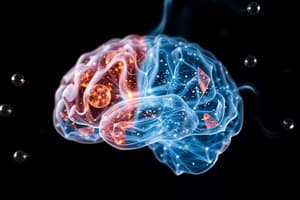Podcast
Questions and Answers
What is characterized by acquired knowledge and the ability to retrieve it?
What is characterized by acquired knowledge and the ability to retrieve it?
- Emotional Intelligence
- Fluid Intelligence
- Crystallized Intelligence (correct)
- Creative Intelligence
Which ability is associated with seeing complex relationships and solving problems?
Which ability is associated with seeing complex relationships and solving problems?
- Fluid Intelligence (correct)
- Analytical Intelligence
- Emotional Intelligence
- Crystallized Intelligence
Who developed the triarchic theory of intelligence?
Who developed the triarchic theory of intelligence?
Robert Sternberg
The analytical intelligence component of the triarchic theory of intelligence is demonstrated by the ability to ________.
The analytical intelligence component of the triarchic theory of intelligence is demonstrated by the ability to ________.
Schemata are a(an) ________.
Schemata are a(an) ________.
Which term refers to the vocabulary of a language?
Which term refers to the vocabulary of a language?
Someone with an IQ of 115 would be described as ________.
Someone with an IQ of 115 would be described as ________.
Scientists who study cognition are searching for ways to understand how we ________, organize, and utilize our conscious cognitive experiences without being aware of all of the unconscious work that our brains are doing.
Scientists who study cognition are searching for ways to understand how we ________, organize, and utilize our conscious cognitive experiences without being aware of all of the unconscious work that our brains are doing.
From a psychological perspective, the term cognition means ________.
From a psychological perspective, the term cognition means ________.
Ilayda assumes that her professors spend their free time reading books and engaging in intellectual conversation, because the idea of them spending their time playing volleyball or visiting an amusement park does not fit in with her stereotypes of professors. This exemplifies ________.
Ilayda assumes that her professors spend their free time reading books and engaging in intellectual conversation, because the idea of them spending their time playing volleyball or visiting an amusement park does not fit in with her stereotypes of professors. This exemplifies ________.
An anchoring bias occurs when you focus on ________.
An anchoring bias occurs when you focus on ________.
What is also known as 'street smarts'?
What is also known as 'street smarts'?
What type of intelligence is aligned with academic problem solving and computations?
What type of intelligence is aligned with academic problem solving and computations?
What type of intelligence involves the ability to produce new products or ideas?
What type of intelligence involves the ability to produce new products or ideas?
What is Gardner's theory that each person possesses at least eight types of intelligence?
What is Gardner's theory that each person possesses at least eight types of intelligence?
What is the ability to understand emotions and motivations in yourself and others called?
What is the ability to understand emotions and motivations in yourself and others called?
A(an) ________ is a mental construct consisting of a cluster or collection of related concepts.
A(an) ________ is a mental construct consisting of a cluster or collection of related concepts.
Illnesses such as diabetes and stomach cancer kill more than twice the number of Americans than murder or car accidents. This concept is referred to as the ________.
Illnesses such as diabetes and stomach cancer kill more than twice the number of Americans than murder or car accidents. This concept is referred to as the ________.
In psychology, concepts can be divided into two categories: ________ and ________.
In psychology, concepts can be divided into two categories: ________ and ________.
Which concept is a type of mental set where you cannot perceive an object being used for something other than what it was designed for?
Which concept is a type of mental set where you cannot perceive an object being used for something other than what it was designed for?
What is the ability with which people can understand and relate to those in another culture?
What is the ability with which people can understand and relate to those in another culture?
Parents of African American students filed a case against the state of California in 1979 because they believed the testing method used to identify students with learning disabilities was ________.
Parents of African American students filed a case against the state of California in 1979 because they believed the testing method used to identify students with learning disabilities was ________.
Tasks that require you to compare, contrast, or evaluate are using the ________ intelligence component of the triarchic theory of intelligence.
Tasks that require you to compare, contrast, or evaluate are using the ________ intelligence component of the triarchic theory of intelligence.
Which of the following is key to generating a bell curve?
Which of the following is key to generating a bell curve?
Which learning disability is characterized by difficulty spelling words correctly and mixing up letters?
Which learning disability is characterized by difficulty spelling words correctly and mixing up letters?
Knowing what a rainbow looks like because you have seen a rainbow is an example of a ________ concept.
Knowing what a rainbow looks like because you have seen a rainbow is an example of a ________ concept.
Emily is an adult with a 4th-grade skill level in reading, writing, and math. Her doctor suggests there is no reason she can't find a job and live independently. Which subtype of intellectual disability describes Emily?
Emily is an adult with a 4th-grade skill level in reading, writing, and math. Her doctor suggests there is no reason she can't find a job and live independently. Which subtype of intellectual disability describes Emily?
Flashcards are hidden until you start studying
Study Notes
Types of Intelligence
- Crystallized Intelligence: Represents acquired knowledge and the ability to recall it.
- Fluid Intelligence: Involves the capacity to identify complex relationships and resolve problems.
- Triarchic Theory of Intelligence: Proposed by Robert Sternberg, it encompasses practical, creative, and analytical intelligence.
Analytical and Practical Intelligence
- Analytical Intelligence: Relates to problem-solving and the ability to analyze, judge, and compare information.
- Practical Intelligence: Often referred to as "street smarts," emphasizes real-world problem-solving capabilities.
- Creative Intelligence: Involves the ability to generate new ideas or innovative solutions to challenges.
Understanding Cognition
- Cognition: Refers to the mental processes of thinking, organizing, and utilizing conscious experiences.
- Schemata: Mental frameworks that help organize information for more efficient processing.
Tests and Measurement of Intelligence
- IQ Test Average: The median score is 100, with one standard deviation set at 15. An IQ of 115 indicates one standard deviation above the mean.
- Availability Heuristic: Refers to the cognitive bias of overestimating the frequency of events based on how easily examples come to mind, such as illnesses compared to accidents.
- Bell Curve: Involves statistical distribution; a key factor in its generation is sample size.
Biases and Errors in Thinking
- Representational Bias: When stereotypes influence perceptions, as seen in assumptions about professors.
- Anchoring Bias: The tendency to focus on a single piece of information while disregarding broader contexts.
- Functional Fixedness: A cognitive bias where one cannot see an object used for something other than its intended function.
Learning Disabilities and Concepts
- Dyslexia: A learning disability characterized by difficulties in spelling and mixing up letters in words.
- Natural Concepts: Comprised of ideas formed through direct experience, such as recognizing a rainbow.
Types of Intelligence Theories
- Multiple Intelligences Theory: Howard Gardner's theory proposing that individuals have at least eight different types of intelligence, broadening the understanding of cognitive abilities.
- Emotional Intelligence: The skill to recognize and understand emotions in oneself and others, facilitating better interpersonal relationships.
Educational Implications and Issues
- Cultural Intelligence: The ability to interact and relate effectively to people from different cultural backgrounds.
- Equity in Testing: Concerns about cultural bias in testing methods for learning disabilities, highlighted by the 1979 case involving African American students in California.
Intellect and Developmental Considerations
- Intellectual Disability Subtypes: Mild intellectual disability is characterized by functioning at a lower grade level without significant barriers to independent living.
- Concept Categories: Concepts in psychology can be classified into two categories: natural and artificial, based on their formation and understanding.
Studying That Suits You
Use AI to generate personalized quizzes and flashcards to suit your learning preferences.



